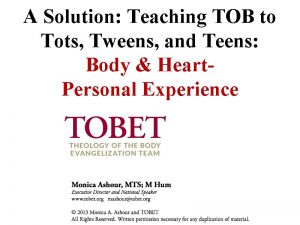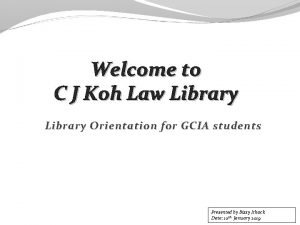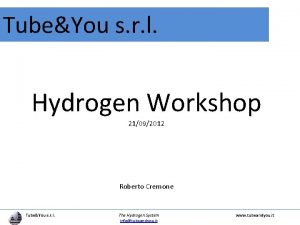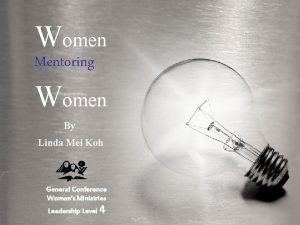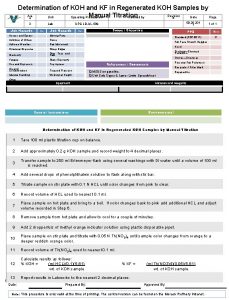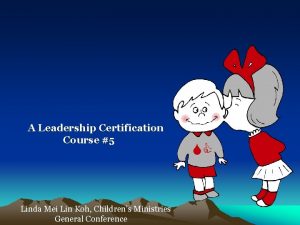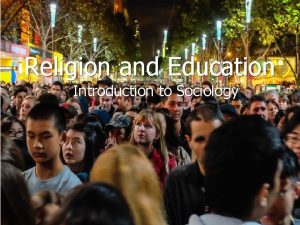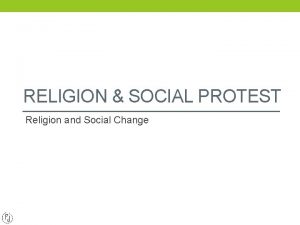Teens and Religion Linda Mei Lin Koh GC





























- Slides: 29

Teens and Religion Linda Mei Lin Koh GC CHM Director

Why Do We Need to Understand Teens? (Barna) Teens largely define the values and leisure endeavors of the nation. The economy is substantially shaped by their choices as consumers and their work habits in the work force. The nature of the family depends on how teens prioritize family and approach parenting. The future of the Church will be determined by their faith commitments.

“Adolescence is an age where the individual is concerned with what is spiritual and sacred. ” Samuel Pfromm Netto, Psychology of Adolescence, 307

Religious Needs of Teens • • They need to have a good relationship with religious authorities, such as parents and teachers so that they can see in them coherence between what they live and what they preach. • They need to have correct concepts regarding religion at this time on their own so that they opt for the faith in Jesus.

Some Facts about Teens & Religion ■Many think teenagers do not like/are not interested in religion. ■ Studies have shown that “adolescence is an age where the individual is concerned with what is spiritual and sacred. ” ■ It’s true that this phase of teenage life produces radical transformations not only in confronting their relationship with God, but with all aspects of their life. ■ The individual is no longer a child, so that by himself, he may discover manner and forms of living and religion that was taught to him.

Teenage is the Best Phase of Life for Religion Religious concepts gain more precision and depth in the final years of childhood and during puberty. It is the best phase of life to strengthen religious values and a relationship with God.

Teenage is the Best Phase of Life for Religion It is in the teenage years that conversion take place; it is the period in which the majority of religious leaders decided to be ministers and missionaries (Mc. Dowell, 317)

What Are Teens Seeking? They seek in religion its rationality and its logic. They question religion for its values and its practical utility. They want to know if religion is useful for something that is meaningful in life.

Key Factors in Teens’ Response Positive response to religion depends on the role models exhibited by parents and the individuals who affect the religious life of the child and the adolescent. The rebelliousness of the teen toward religion is a form of rebelling against the people who desire to impose upon them religion which they themselves many times do not practice.

He wa nts rel with s piritua igion. He is conce l matt securi rned ers. H ty tha e desi t relig res the i o n gives t huma o the n bein g x o d a r a P He rejects it, distances himself from it, becomes critical, hard and inflexible because of what he sees and lives within it

What Separates Teens from Religion? The quality of the interpersonal relationships between teens and those who exercise religious authority. Inconsistency between what is professed as belief and what is lived. Concepts that teens have regarding religion.

Religion, Identify and Independence When the young teen establishes differences between himself and his parents, he can reach the point of not accepting some values and customs adopted by them, as a means of seeing himself as a person with his own identity.

• The rebellion or challenge of the teen is related to his uneasiness regarding his identity. In his declaration of independence, he rejects the concepts and teaching of his initial phase.

If parents or other authority figures understand the necessity and the nature of the process of emancipation, they can really help with intelligent and understanding guidance. If we impose value system on teen, not allowing him to obtain a separate identity Rejection of religion

Are Teens Really Rejecting Religion? Teens are not directly against religion, but against the authority which sustains religion. Such rebellion is the personal method of the young person to free himself from the restrictions that hinder him from obtaining a separate personality. The more rigid and authoritarian the religious authority is, especially when it is combined with severity and impatience, the more the teen will reject religion.

The National Study of Youth and Religion 1. Religious Participation • Teens are relatively actively in religious organizations and activities. • Teens attend Sunday school, church, or youth groups, pray and study the Bible.

The National Study of Youth and Religion 2. Theological Beliefs • Teens are likely to hold many traditional Christian religious beliefs. • Majority of teens believe in God, afterlife, angels, miracles, demons, judgment.

The National Study of Youth and Religion 3. Christian Religions Beliefs Teens from conservative denominations more likely than mainline teens to hold these religious beliefs. •

The National Study of Youth and Religion 4. Importance of Faith • • Majority of teens report that their religious faith is very important in their lives. • Most of them have shared their faith with someone not of their faith & have had a powerful worship experience.

The National Study of Youth and Religion 5. Evaluation of Churches • Majority of teens express relatively positive views of their churches and fellow church members. • They would continue going to church if given the choice & that their church is warm & welcoming.

George Barna’s Research COMMITMENT TO CHRISTIANITY 1997 1998 1999 2000 Absolutely committed to it 29% 27% 26% 31% Moderately committed to it 47 53 57 49 18 16 14 14 7 5 3 5 620 605 614 605 Not too committed to it Not at all committed to it Sample Size



What Makes a Church Appealing? People are friendly & care about each other A Community with genuine relationships, supportive & familyoriented High quality teaching & preaching Theological beliefs and doctrine of the church Quality of programs and classes for children The church being involved in helping poor and disadvantaged people

Barna’s Advice for Youth Leaders Understand the world of the teenager— the cultural context of the young person. Read their magazines, watch their TV shows, talk to them… Enter with a Worldview—integrate your faith into their practical life. Teens are impacted by your modeling. Enter with a philosophy of Youth Ministry. Pray daily for the development of teens. Find resources that help you to be effective.

George Barna’s Advice for Parents • Guide Teens in Their Search for Meaning • Define Appropriate Values • Family Connection • Faith Connection

Conclusion The teen is open to religion. He/she is vulnerable. He/she is an inquirer, he does not accept everything that he is told, he wants proof, he wants to see, but he is receptive. It is a great phase of life. A great opportunity to make a vulnerable decision for Jesus. Satan has taken advantage of this phase to destroy the life of God’s children.

What Can Be Done? A specific ministry to work with teens. We cannot waste this phase. If we maintain them in Christ at this age, the possibilities that they will remain in Him for their entire life is very great. Tomorrow can be too late!

References George Barna, Real Teens (Ventura, CA: Regal Books, 2001) Philip Schwadel & Christian Smith, “Portraits of Protestant Teens: A Report on Teenagers in Major U. S. Denominations (Chapel Hill, NC: National Study of Youth and Religion (NSYR), 2005. ) Roger Dudley, Why Teenagers Reject Religion and What to Do About It (Hagerstown, MD: Review and Herald Publishing Association, 1978). Roger Dudley, The Complex Religion of Teens (Hagerstown, MD: Review and Herald Publishing Association, 2007). Samuel Pfromm Netto, Psychology of Adolescence (Sao Paulo: Pioneira, Brasilia, INL, 1976. Christian Smith & Melinda Lunquist Denton, Soul Searching: the Religious and Spiritual Lives of American Teenagers (Oxford University Press, 2005)
 Linda mei-lin koh
Linda mei-lin koh Linda mei
Linda mei Secneer
Secneer Dr koh and trory
Dr koh and trory Tots tweens and teens
Tots tweens and teens C j koh law library
C j koh law library Nus libraries exam papers
Nus libraries exam papers Damin i koh
Damin i koh Glicerol wzór sumaryczny
Glicerol wzór sumaryczny Porridge king alvin koh
Porridge king alvin koh Cyklopentylometanol
Cyklopentylometanol Arrhenius acids examples
Arrhenius acids examples An-tih-koh-ag-yoo-lant
An-tih-koh-ag-yoo-lant Yeast on koh
Yeast on koh Koh test positive result
Koh test positive result Koh energi indonesia
Koh energi indonesia Cine a inventat chimia
Cine a inventat chimia Koh titration with hcl
Koh titration with hcl Wong koh wei
Wong koh wei Jean koh peters
Jean koh peters Koh кислота
Koh кислота Ca + hcl
Ca + hcl Addycja bromu do propenu
Addycja bromu do propenu Elektroliza zadania
Elektroliza zadania Koh lanta saison 1
Koh lanta saison 1 Koh alkaline
Koh alkaline Principle of isolation of casein from milk
Principle of isolation of casein from milk What are concentration cells
What are concentration cells Pewarnaan koh
Pewarnaan koh Koh-ichiro morita
Koh-ichiro morita




